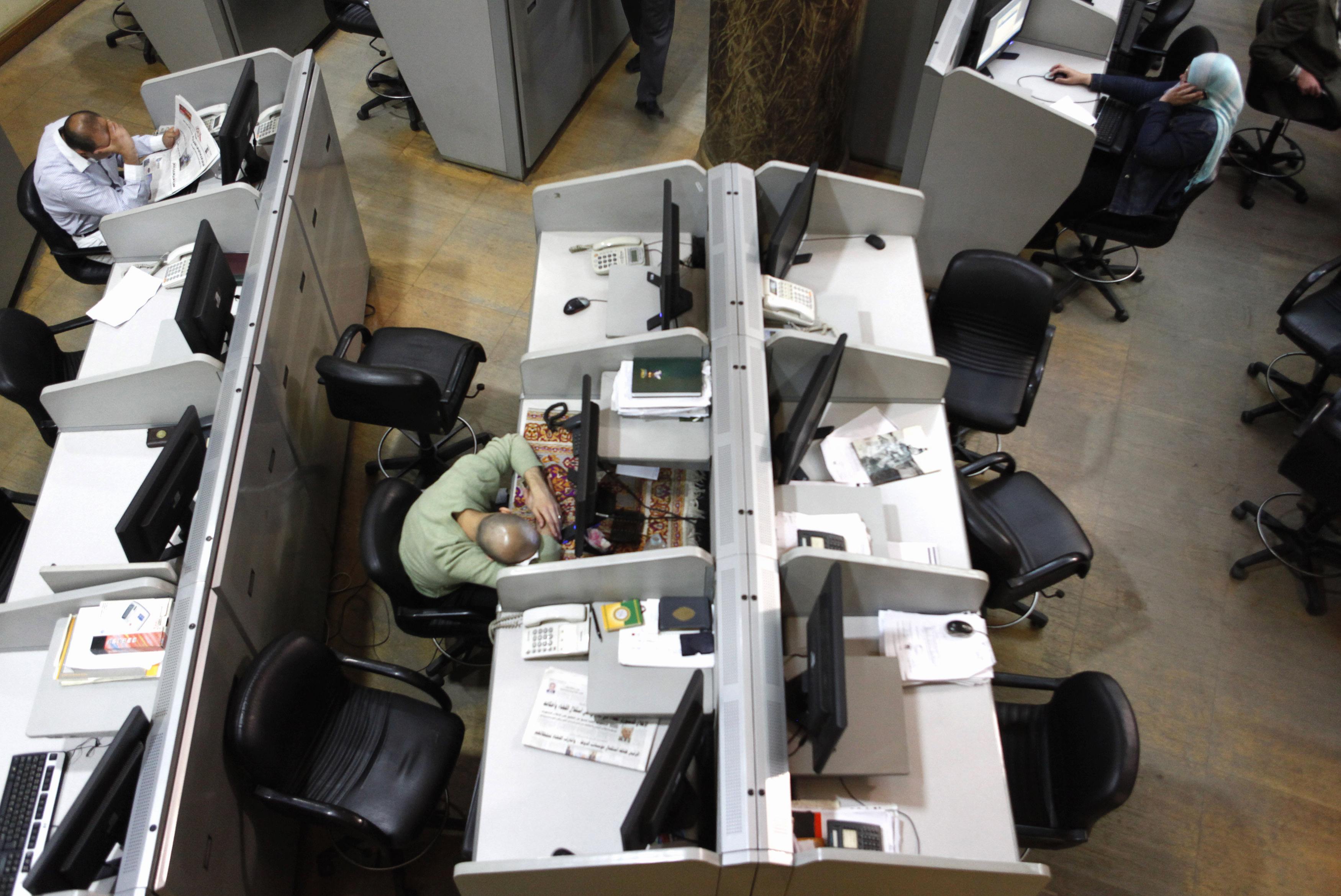Latest NEWS
- Aswat Masriya, the last word
- Roundup of Egypt's press headlines on March 15, 2017
- Roundup of Egypt's press headlines on March 14, 2017
- Former Egyptian President Hosni Mubarak to be released: lawyer
- Roundup of Egypt's press headlines on March 13, 2017
- Egypt's capital set to grow by half a million in 2017
- Egypt's wheat reserves to double with start of harvest -supply min
- Roundup of Egypt's press headlines on March 12, 2017
Egypt stock plunge after Mursi power grab

A man rests at his desk at the Egyptian stock market in Cairo, November 25, 2012. Egyptian share prices plunge, with the benchmark index losing nearly 10 percent in the first trading session since President Mohamed Mursi ignited a political crisis by expanding his powers. REUTERS/Asmaa Waguih
CAIRO, Nov 25 (Reuters) - Egypt's stock market plunged on Sunday in its first day open since Islamist President Mohamed Mursi seizure of new powers set off street violence and a political crisis, unravelling efforts to restore stability after last year's revolution.
More than 500 people have been injured in protests since Friday, when Egyptians awoke to news that Mursi had issued a decree widening his powers and shielding them from judicial review.
Mursi's Muslim Brotherhood supporters were expected to turn out again on the streets in a show of support after prayers on Sunday afternoon. His supporters and opponents are both planning massive demonstrations on Tuesday that many fear will lead to more violence.
Sunday's stock market fall of nearly 10 percent - halted only by automatic curbs - was the worst since the uprising that toppled Hosni Mubarak in Feb 2011. Images of protesters clashing with riot police and tear gas wafting through Cairo's Tahrir Square were an unsettling reminder of that revolution.
"We are back to square one, politically, socially," said Mohamed Radwan of Pharos Securities, an Egyptian brokerage firm.
Judges announced on Saturday they would go on strike. Liberal politician Mohammed ElBaradei called Mursi a "dictator".
Forged out of the once-banned Muslim Brotherhood, the Mursi administration has defended his decree as an effort to speed up reforms that will complete Egypt's democratic transformation.
Yet leftists, liberals, socialists and others say it has exposed the autocratic impulses of a man once jailed by Mubarak, while Islamist parties have rallied behind Mursi.
"There is no room for dialogue when a dictator imposes the most oppressive, abhorrent measures and then says 'let us split the difference'," prominent opposition leader ElBaradei said.
"I am waiting to see, I hope soon, a very strong statement of condemnation by the U.S., by Europe and by everybody who really cares about human dignity," he said in an interview with Reuters and the Associated Press.
Activists opposed to the Mursi decree were camped out in central Cairo for a third consecutive day. State media reported that Mursi met for a second day with his advisers.
"I am really afraid that the two camps are paving the way for violence," said Hassan Nafaa, a professor of political science at Cairo University. "Mursi has misjudged this, very much so. But forcing him again to relinquish what he has done will appear a defeat."
WARNINGS FROM WEST
Mursi's decree drew warnings from Western countries to uphold democracy, a day after he had received glowing tributes from the United States and others for his work brokering a deal to end eight days of violence between Israel and Hamas.
"Investors know that Mursi's decisions will not be accepted and that there will be clashes on the street," said Osama Mourad of Arab Financial Brokerage.
Investors had grown more confident in recent months that a legitimately elected government would help Egypt put its economic and political problems behind it. The stock market's main index had risen 35 percent since Mursi's victory.
Just last week, investor confidence was helped by a preliminary agreement with the International Monetary Fund over a $4.8 billion loan needed to shore up state finances.
Issued late on Thursday, the Mursi decree marks an effort to consolidate his influence after he successfully sidelined Mubarak-era generals in August. Analysts say it reflects Muslim Brotherhood suspicions of sections of a judiciary that is largely unreformed from the Mubarak era.
The decree defends from judicial review decisions taken by Mursi until a new parliament is elected. That vote is expected early next year.
It also shields the Islamist-dominated assembly writing Egypt's new constitution from a raft of legal challenges that have threatened the body with dissolution, and offers the same protection to the Islamist-controlled upper house of parliament.
Many of Mursi's political opponents share the view that Egypt's judiciary needs reform. But they see the decree as a threat to the country's nascent democracy. (Editing by Peter Graff)










